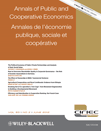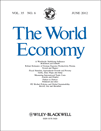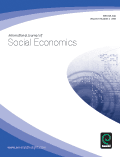
Annals of Public and Cooperative Economics
Scope & Guideline
Navigating the Complexities of Public and Cooperative Economics
Introduction
Aims and Scopes
- Cooperative Economics and Development:
Research focused on the economic performance and sustainability of cooperatives, exploring their impact on local and national economies. - Public Policy and Governance:
Investigates the relationship between cooperative organizations and public policies, including governance structures and regulatory frameworks that affect cooperative performance. - Social Capital and Community Development:
Studies the role of cooperatives in building social capital and enhancing community welfare, particularly in rural and marginalized areas. - Sustainability and Social Innovation:
Explores how cooperatives contribute to environmental sustainability and social innovation, particularly in agriculture, finance, and public services. - Gender and Inclusivity in Cooperatives:
Examines the role of cooperatives in promoting gender equality and inclusivity, focusing on women's participation and leadership within cooperative structures.
Trending and Emerging
- Digital Economy and Platform Cooperativism:
There is a growing interest in how cooperatives can operate within the digital economy, emphasizing democratic governance and equitable access to digital resources. - Financial Inclusion and Microfinance:
The role of cooperatives in promoting financial inclusion, particularly through microfinance initiatives, has gained traction, reflecting global efforts to enhance access to financial services. - Impact of Social Capital on Economic Performance:
Research increasingly focuses on how social capital within cooperatives influences economic outcomes, highlighting the importance of trust and community ties. - Sustainable Development Goals (SDGs):
Cooperatives are being examined for their contributions to achieving SDGs, particularly in areas such as poverty reduction, gender equality, and sustainable agriculture. - Innovations in Cooperative Governance:
Emerging studies are exploring novel governance structures within cooperatives that promote inclusivity and member engagement, adapting to contemporary economic challenges.
Declining or Waning
- Traditional Agricultural Cooperatives:
Research focusing solely on traditional agricultural cooperatives appears to be waning, as newer models and hybrid forms of cooperatives gain attention. - State-Owned Enterprises (SOEs):
There has been a noticeable decrease in articles specifically addressing SOEs, suggesting a shift towards more diverse forms of cooperative governance and management. - Public Sector Entrepreneurship:
The exploration of governmental roles in cooperative entrepreneurship seems to be less prominent, possibly due to a move towards examining more grassroots and community-led initiatives. - Historical Analysis of Cooperatives:
Papers analyzing the historical context of cooperatives are less frequent, indicating a potential shift towards contemporary issues and practical applications.
Similar Journals

Boletin de la Asociacion Internacional de Derecho Cooperativo-International Association of Cooperative Law Journal
Connecting Research and Practice in Cooperative Law.Boletin de la Asociacion Internacional de Derecho Cooperativo-International Association of Cooperative Law Journal, published by UNIV DEUSTO, FAC DERECHO, is a prominent open-access journal since 2000, dedicated to advancing the field of cooperative law. With an ISSN of 1134-993X and E-ISSN 2386-4893, this journal showcases rigorous research, case studies, and theoretical explorations that are essential for legal scholars, professionals, and students interested in the cooperative sector. Operating from Spain, it brings a rich European perspective to global discussions, as reflected in its 2023 ranking in the second quartile (Q2) in Law, with a respectable Scopus rank of #396 out of 1025 and a 61st percentile in Social Sciences_ Law. The journal not only serves as a vital resource for understanding cooperative principles and their legal implications but also promotes interdisciplinary dialogue among researchers and practitioners committed to fostering cooperative enterprises worldwide. Its converged years from 2013 to 2024 indicate an ongoing commitment to embracing contemporary legal challenges while adhering to the highest academic standards.

Montenegrin Journal of Economics
Connecting Local and Global Economic PerspectivesMontenegrin Journal of Economics, published by ECONOMIC LABORATORY TRANSITION RESEARCH PODGORICA-ELIT, stands as a prominent platform for scholarly discourse in the field of Economics, Econometrics, and Finance. With an ISSN of 1800-5845 and an E-ISSN of 1800-6698, this open access journal has been providing accessible research output since 2005, contributing significantly to the global academic community. The journal’s impact is reflected in its Q2 ranking in the 2023 category of Economics, Econometrics and Finance, holding a commendable position within the 81st percentile according to Scopus rankings. The scope includes a wide array of topics pertinent to economics and finance, encouraging contributions that enhance understanding of both local and global markets. With a focus on quality research, the journal aims to disseminate knowledge that supports informed policy-making and fosters economic development, making it an invaluable resource for researchers, professionals, and students dedicated to the evolving landscape of economic studies.

WORLD ECONOMY
Elevating discussions on pressing economic issues worldwide.WORLD ECONOMY is a premier academic journal published by Wiley, renowned for its rigorous peer-reviewed research in the fields of economics, finance, accounting, and political science. Established in 1977, the journal has consistently contributed to the advancement of knowledge, reflected in its strong standing across various category quartiles, notably achieving Q1 in Accounting and Political Science, and ranking in the top quartile in its respective disciplines as of 2023. With an audience that spans researchers, professionals, and students, WORLD ECONOMY publishes impactful articles that explore critical issues affecting the global economy. Although it is not an open-access publication, readers have access options to engage with cutting-edge research that addresses both theoretical and practical aspects of world economic trends. The journal's commitment to excellence is further underscored by its impressive Scopus rankings, situating it among the top journals in the social sciences arena. For anyone keen on deepening their understanding of the dynamics shaping our economic landscape, WORLD ECONOMY remains an indispensable resource.

Journal of Co-operative Organization and Management
Unleashing the Power of Co-operative StrategiesJournal of Co-operative Organization and Management, published by Elsevier, is a leading academic journal that focuses on the critical analysis and exploration of co-operative organizations within various managerial and strategic frameworks. With an ISSN of 2213-297X and an E-ISSN of 2213-2988, this journal caters to a diverse audience of researchers, professionals, and students interested in understanding the complexities and dynamics of cooperative structures in both business and international management. Ranked Q2 in both Business and International Management and Strategy and Management for 2023, this journal showcases significant contributions to the field, epitomizing quality research that helps enhance organizational efficiency and strategic alignment in co-operative settings. Operating from its base in Amsterdam, the Journal publishes relevant and impactful studies that push the frontiers of knowledge in a rapidly evolving business landscape, thereby establishing itself as a vital resource for those dedicated to advancing their understanding of co-operative management.

Economics Ecology Socium
Bridging economics, ecology, and society for impactful change.Economics Ecology Socium is an impactful open-access journal focused on the intersection of economic systems, ecological sustainability, and societal dynamics. Published by Dr. Viktor Koval, this journal aims to foster interdisciplinary research that addresses contemporary challenges in environmental economics and social policies. Since its inception in 2017, Economics Ecology Socium has become a vital platform for scholars, practitioners, and students to disseminate novel insights and data-driven findings. With a commitment to advancing eco-socioeconomic knowledge, the journal encourages contributions that promote sustainability and improve decision-making processes across various sectors. Its open-access model allows for broad dissemination of research, making crucial knowledge available to a global audience. With an ISSN of 2616-7107 and an E-ISSN of 2786-8958, Economics Ecology Socium is positioned to contribute meaningfully to the global dialogue on economic and ecological issues, ensuring that research reaches those who need it most.

Terra Economicus
Championing Open Access for Global Knowledge ExchangeTerra Economicus, published by Southern Federal University, stands as a significant peer-reviewed academic journal that focuses on the intricate intersections of economics, law, political science, and sociology. With an ISSN of 2073-6606, this journal has carved out a commendable reputation within the academic community, as evidenced by its placement in various category quartiles: Q3 in Economics, Econometrics and Finance, Q1 in History, and Q2 in Law, Political Science, and Sociology as of 2023. Such rankings highlight the journal’s dedication to high-quality scholarship and its impact on interconnected social sciences. The journal not only aims to bridge diverse fields of study but also addresses contemporary issues that require a multidisciplinary approach. Hailing from the Russian Federation, Terra Economicus operates with an open access model, promoting widespread dissemination of knowledge. Its commitment to covering a broad scope of topics makes it a vital resource for researchers, practitioners, and students alike, providing insights and fostering dialogue across various academic disciplines.

Ekonomicheskaya politika
Illuminating the intersection of economics and sociopolitical dynamics.Ekonomicheskaya politika, published by EKONOMICESKAA POLITIKA, is a premier journal dedicated to advancing the fields of economics, finance, and the sociopolitical dimensions impacting economic policies, particularly within the Russian context. Established in 2013, it plays a crucial role in addressing contemporary economic challenges and contributing to scholarly discourse. The journal is indexed in Scopus, demonstrating its relevance and scholarly impact, with its rankings and quartiles reflecting a strong commitment to quality research. Although it operates under a traditional access model, its comprehensive analyses and thought-provoking articles are essential resources for researchers, professionals, and students alike, fostering a deeper understanding of economic trends and policy implications in both global and local arenas. With its convergence of interdisciplinary approaches from economics, political science, and sociology, Ekonomicheskaya politika not only serves as a valuable academic platform but also as a critical reference point for policymakers and practitioners interested in the evolving landscape of economic policy.

INTERNATIONAL JOURNAL OF SOCIAL ECONOMICS
Bridging Economic Theory and Social PracticeThe INTERNATIONAL JOURNAL OF SOCIAL ECONOMICS, published by EMERALD GROUP PUBLISHING LTD, stands out as a premier outlet for advancing the disciplines of economics and social sciences. Established in 1974 and set to continue through 2024, this esteemed journal has garnered a strong reputation, evidenced by its category quartiles in Q2 for both Economics and Econometrics, and Social Sciences (miscellaneous) as of 2023. With a Scopus ranking placing it in the 72nd percentile for General Social Sciences and 60th percentile for Economics, it serves as a vital resource for researchers, professionals, and students seeking to explore and understand the complex interplay between economic phenomena and societal factors. Although the journal does not offer open access, it strives to publish high-quality, rigorous research that addresses contemporary issues, making significant contributions to both academic scholarship and practical application. For those invested in the rich fields of social economics, this journal remains an essential platform for disseminating innovative ideas and solutions.

She Ji-The Journal of Design Economics and Innovation
Exploring the Convergence of Design, Economics, and InnovationShe Ji - The Journal of Design Economics and Innovation is a pioneering Open Access journal published by Elsevier since 2015, based in the Netherlands. With its unique focus on the intersection of design, economics, and innovation, this journal serves as a vital platform for researchers, professionals, and students who are keen on understanding the complexities of designing value-creating innovations. Consistently recognized for its high impact, She Ji holds a prestigious Q1 quartile ranking in both Economics and Education, while maintaining a strong presence in Management of Technology and Innovation and the Visual Arts sector. This reflects its commitment to fostering interdisciplinary dialogue and advancing knowledge in the rapidly evolving fields of design and economic theory. Researchers seeking to disseminate their work can benefit from the journal's robust open access model, ensuring wide visibility and accessibility to their findings. With a commitment to excellence, She Ji continues to shape thought leadership in its field and is an essential resource for anyone involved in the integration of design thinking with economic innovation.

Revista Cooperativismo y Desarrollo-COODES
Championing open access to cooperative insights.Revista Cooperativismo y Desarrollo-COODES is an esteemed academic journal dedicated to the fields of cooperative studies and sustainable development, particularly in the context of Latin America. Published by UNIV PINAR RIO HERMANOS SAIZ MONTES OCA in Cuba, this journal has embraced Open Access since 2013, ensuring that knowledge related to cooperative practices and developmental strategies is broadly disseminated to researchers, practitioners, and scholars alike. With an ISSN of 2310-340X, COODES provides a platform for innovative research and discourse on the roles of cooperatives in social and economic development, thus contributing significantly to the academic community and policy-making discussions. Despite the absence of specific metrics like the H-index or Scopus ranking, the journal is committed to fostering interdisciplinarity and advancing cooperation as a vital mechanism for sustainable growth. Researchers and professionals in the field are encouraged to contribute their findings and insights, enhancing the dialogue around cooperative movements in contemporary society.